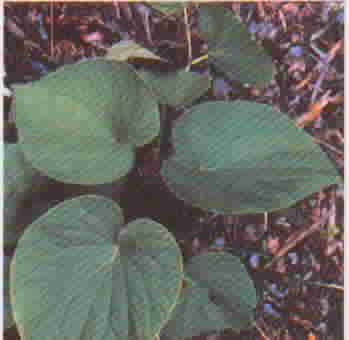 Complementary and alternative medicines (CAM) are frequently given to children and adolescents for reputed benefits for hyperkinetic and concentration disorders such as attention deficit hyperactivity disorder (ADHD).
Complementary and alternative medicines (CAM) are frequently given to children and adolescents for reputed benefits for hyperkinetic and concentration disorders such as attention deficit hyperactivity disorder (ADHD).
Researchers in Arizona and Australia assessed the evidence based on the results of studies providing an acceptable standard of evidence. Continue reading Review: CAM for ADHD →
 Emily Matthews, a reader of this blog, provides this overview of depression and complementary treatment options.
Emily Matthews, a reader of this blog, provides this overview of depression and complementary treatment options.
About 20 million Americans suffer from clinical depression. Low levels of serotonin, a neurotransmitter, are thought to contribute to depression. Depression is also associated with diseases like diabetes, heart disease, chronic pain, hormonal imbalance, hypoglycemia, stress, impaired thyroid function, environmental toxins, and unhealthy lifestyles. Continue reading CAM options for treating depression →
 Researchers at the Brody School of Medicine at East Carolina University, in Greenville, North Carolina tell us, “The number of people with psychiatric disorders who use CAM is on the rise,… estimates of CAM use range from 8% to 57%.” Most of this is to treat anxiety and depression.
Researchers at the Brody School of Medicine at East Carolina University, in Greenville, North Carolina tell us, “The number of people with psychiatric disorders who use CAM is on the rise,… estimates of CAM use range from 8% to 57%.” Most of this is to treat anxiety and depression.
Is it worth the effort? Continue reading Review: CAM for anxiety and related conditions →
 Real and hypothetical concerns exist.
Real and hypothetical concerns exist.
Dr. Mark Moyad (photo), who is Director of Preventive and Alternative Medicine at the University of Michigan Medical Center in Ann Arbor, puts it into perspective. Continue reading Do we overhype drug-supplement interactions? →
 Evidence for CAM to treat depression, anxiety, sleep disorders, and attention-deficit/hyperactivity disorder (ADHD) has been reviewed by researchers at Louisiana State University Health Sciences Center, in Kenner.
Evidence for CAM to treat depression, anxiety, sleep disorders, and attention-deficit/hyperactivity disorder (ADHD) has been reviewed by researchers at Louisiana State University Health Sciences Center, in Kenner.
Here’s what we know. Continue reading Review of CAM for behavioral health →
 Approximately 6.8 million Americans suffer from generalized anxiety disorder. It’s not surprising then that there’s interest in finding effective natural treatments.
Approximately 6.8 million Americans suffer from generalized anxiety disorder. It’s not surprising then that there’s interest in finding effective natural treatments.
The Global Neuroscience Initiative Foundation, in Los Angeles, California, reviewed the evidence for passionflower, lysine, magnesium, kava, and St John’s wort, alone or in combination. Continue reading Nutritional herbal supplements for treating anxiety →
 Cytochrome P450 2D6 (CYP2D6) is a liver enzyme responsible for the metabolism of approximately 30% of all drugs.
Cytochrome P450 2D6 (CYP2D6) is a liver enzyme responsible for the metabolism of approximately 30% of all drugs.
Researchers at the University of Arkansas for Medical Sciences in Little Rock studied the effect of CYP2D6 on the metabolism of several herbal supplements and the risk of drug interactions. Continue reading CYP2D6-mediated herb-drug interactions →
 This is the first study of St. John’s wort + kava to treat major depressive disorder with underlying anxiety, according to researchers from The University of Queensland, Australia. Continue reading St. John’s wort + kava for major depression with anxiety →
This is the first study of St. John’s wort + kava to treat major depressive disorder with underlying anxiety, according to researchers from The University of Queensland, Australia. Continue reading St. John’s wort + kava for major depression with anxiety →
 Does it matter whether the kava formulation is an aqueous, ethanolic, or acetonic extract?
Does it matter whether the kava formulation is an aqueous, ethanolic, or acetonic extract?
Researchers from the Johann Wolfgang Goethe-University of Frankfurt/Main, in Germany tell us the risk of liver toxicity exists with all forms of kava. Continue reading Risk of liver toxicity from kava formulations →
 Â A broad range of mood disorders were reviewed by researchers at the Royal Brisbane and Women’s Hospital, in Queensland, Australia. Continue reading Kava and St. John’s wort: Evidence for mood and anxiety disorders →
 A broad range of mood disorders were reviewed by researchers at the Royal Brisbane and Women’s Hospital, in Queensland, Australia. Continue reading Kava and St. John’s wort: Evidence for mood and anxiety disorders →
 The relationship between supplements and lead levels in blood has been an ongoing project for researchers in Boston.
The relationship between supplements and lead levels in blood has been an ongoing project for researchers in Boston.
In this study, researchers from Beth Israel Deaconess Medical Center report specific herbal supplements are associated with higher blood lead levels among women. Continue reading Herbals and lead levels in Americans →
 That’s the result from a survey of internal medicine residency programs in the US. Continue reading Medical residents don’t know dietary supplements →
That’s the result from a survey of internal medicine residency programs in the US. Continue reading Medical residents don’t know dietary supplements →
 Piper methysticum (kava) has been withdrawn for sale in several countries due to concerns over liver toxicity.
Piper methysticum (kava) has been withdrawn for sale in several countries due to concerns over liver toxicity.
The WHO recently recommended research into “aqueous” extracts of kava. Here are the results the Kava Anxiety Depression Spectrum Study (KADSS). Continue reading “Aqueous” extracts of kava to treat depression and anxiety →
 Researchers from the Mayo Clinic in Rochester, Minnesota have reviewed the evidence and report that most interactions are confined to a relatively small number of drug classes and supplements. Continue reading Drug-supplement interactions in perspective →
Researchers from the Mayo Clinic in Rochester, Minnesota have reviewed the evidence and report that most interactions are confined to a relatively small number of drug classes and supplements. Continue reading Drug-supplement interactions in perspective →
 OK, you’re scheduled for surgery, and you take herbals.
OK, you’re scheduled for surgery, and you take herbals.
Does your surgeon know what you take?
Be smart. If you use any of the herbals on this list, tell your surgeon.
Continue reading What not to take before surgery →
 Researchers from Goethe-University Frankfurt/Main in Germany took a detailed look at reports of liver toxicity associated with taking kava.
Researchers from Goethe-University Frankfurt/Main in Germany took a detailed look at reports of liver toxicity associated with taking kava.
They uncover potential risks associated with taking this popular herbal. Continue reading Risk factors for liver toxicity from kava →
 Here’s a review of the evidence by researchers at the University of Western Australia in Perth. Continue reading The role of CAM to treat anxiety and depression →
Here’s a review of the evidence by researchers at the University of Western Australia in Perth. Continue reading The role of CAM to treat anxiety and depression →
 Dr. Stephen Bent is Assistant Professor of Medicine at the Osher Center for Integrative Medicine at the University of California, San Francisco.
Dr. Stephen Bent is Assistant Professor of Medicine at the Osher Center for Integrative Medicine at the University of California, San Francisco.
Here’s his view. Continue reading A Bent view of herbals →
 Sprinkles is a nutritional supplement containing iron, zinc, vitamin A, folic acid, and vitamin C. Researchers from Cornell University in Ithaca, New York traveled to Haiti to do the study. Continue reading Using Sprinkles to reduce anemia in children →
Sprinkles is a nutritional supplement containing iron, zinc, vitamin A, folic acid, and vitamin C. Researchers from Cornell University in Ithaca, New York traveled to Haiti to do the study. Continue reading Using Sprinkles to reduce anemia in children →
Complementary and Alternative Medicine: Fair, Balanced, and to the Point
 Complementary and alternative medicines (CAM) are frequently given to children and adolescents for reputed benefits for hyperkinetic and concentration disorders such as attention deficit hyperactivity disorder (ADHD).
Complementary and alternative medicines (CAM) are frequently given to children and adolescents for reputed benefits for hyperkinetic and concentration disorders such as attention deficit hyperactivity disorder (ADHD).


 Cytochrome P450 2D6 (CYP2D6) is a liver enzyme responsible for the metabolism of approximately 30% of all drugs.
Cytochrome P450 2D6 (CYP2D6) is a liver enzyme responsible for the metabolism of approximately 30% of all drugs. This is the first
This is the first  Does it matter whether the kava formulation is an aqueous, ethanolic, or acetonic extract?
Does it matter whether the kava formulation is an aqueous, ethanolic, or acetonic extract?
 The relationship between supplements and lead levels in blood has been an ongoing project for researchers in Boston.
The relationship between supplements and lead levels in blood has been an ongoing project for researchers in Boston. That’s the result from a
That’s the result from a  OK, you’re scheduled for surgery, and you take herbals.
OK, you’re scheduled for surgery, and you take herbals. Dr. Stephen Bent is Assistant
Dr. Stephen Bent is Assistant  Sprinkles is a nutritional supplement containing iron, zinc, vitamin A, folic acid, and vitamin C. Researchers from Cornell University in Ithaca, New York traveled to Haiti to do the
Sprinkles is a nutritional supplement containing iron, zinc, vitamin A, folic acid, and vitamin C. Researchers from Cornell University in Ithaca, New York traveled to Haiti to do the